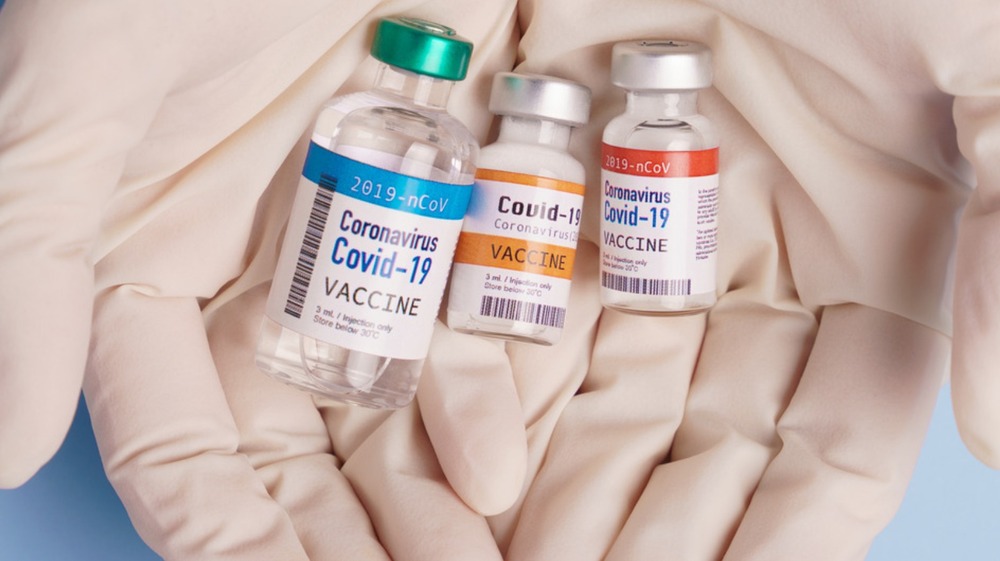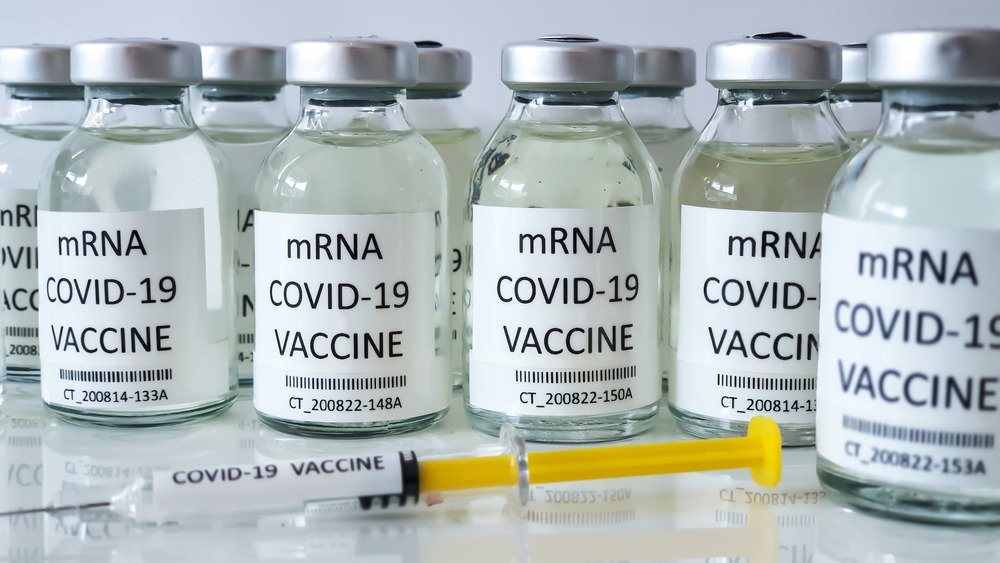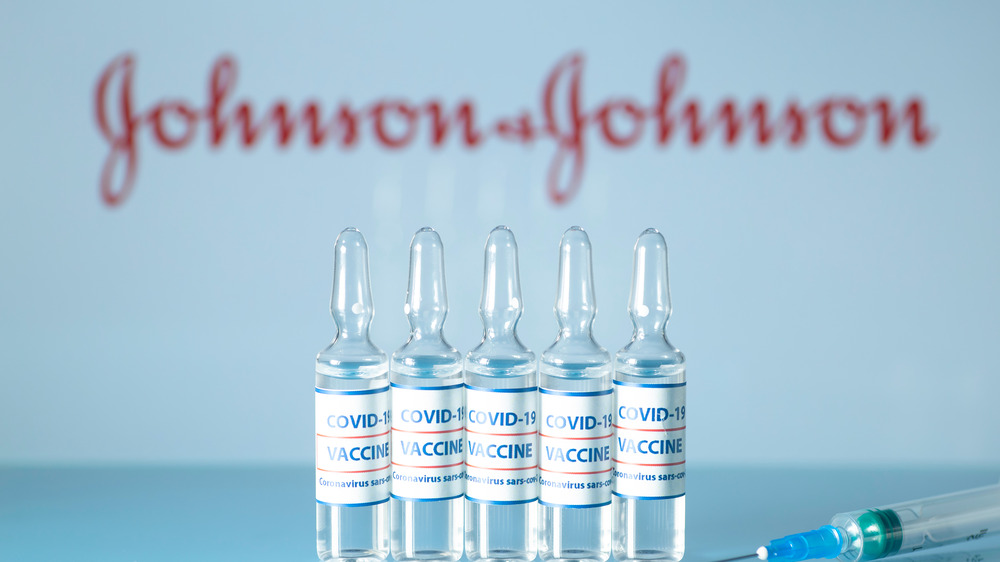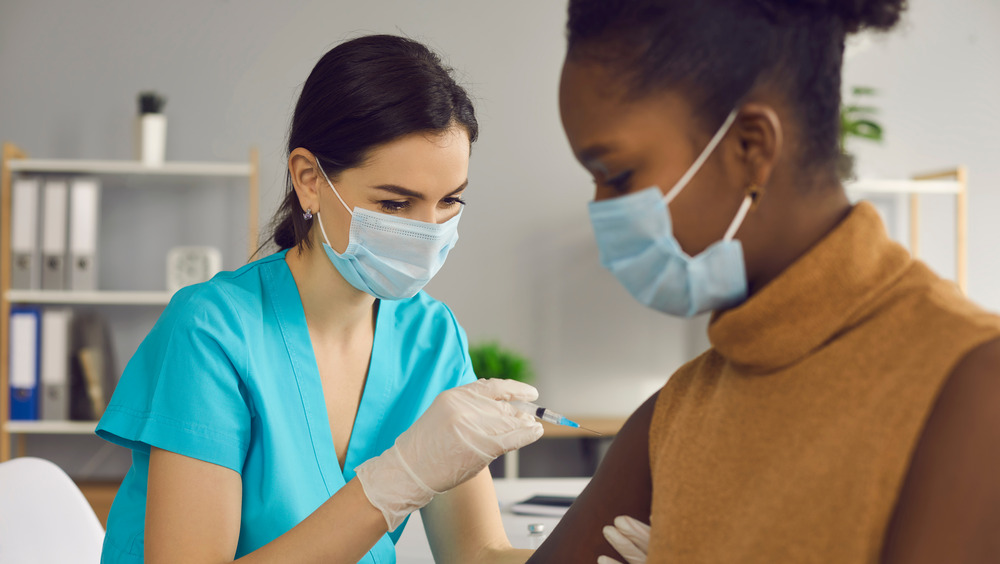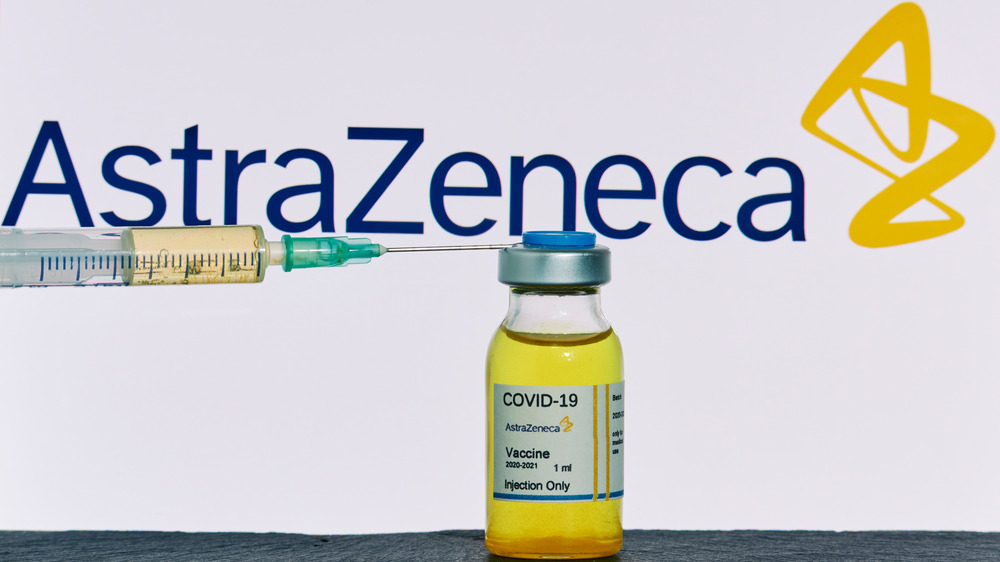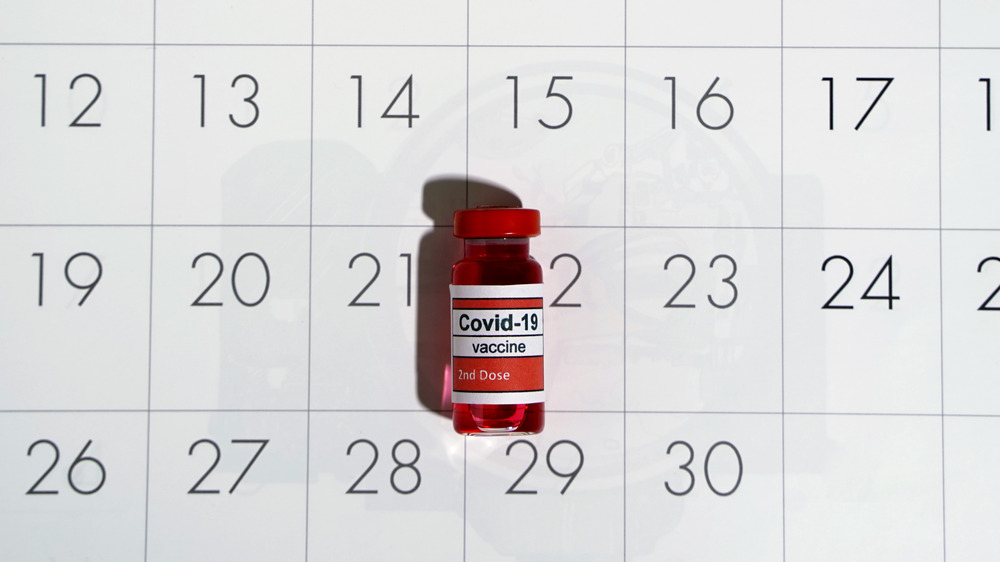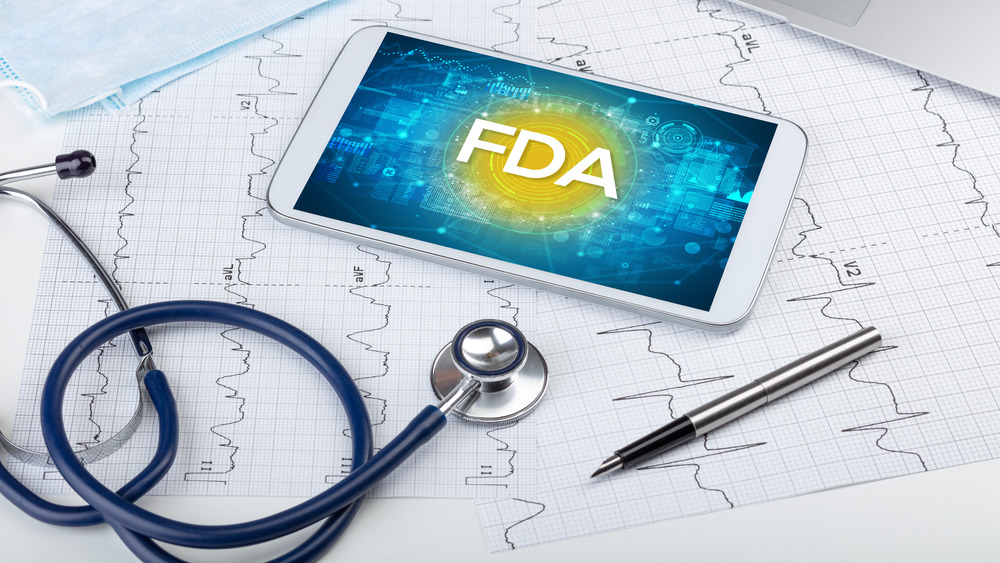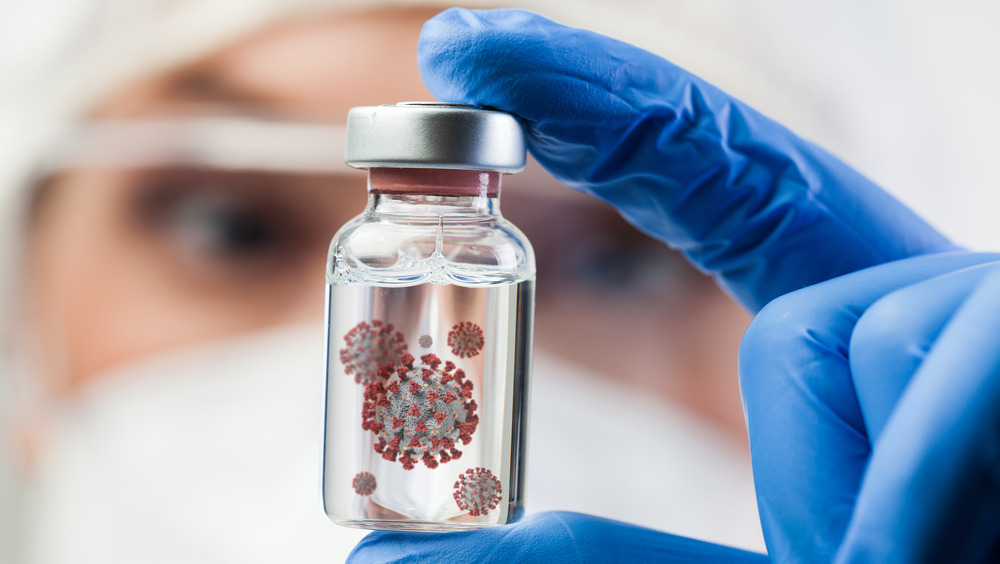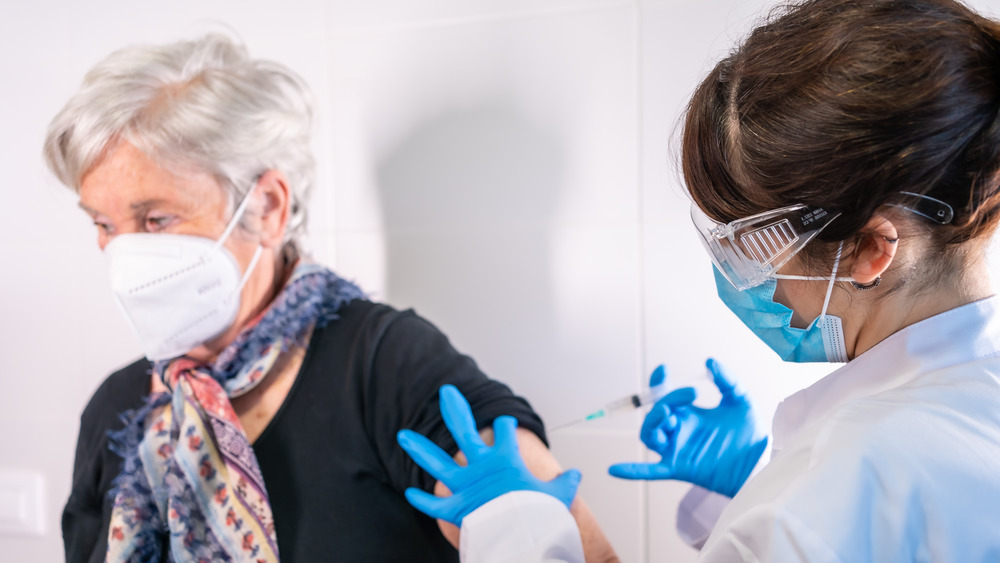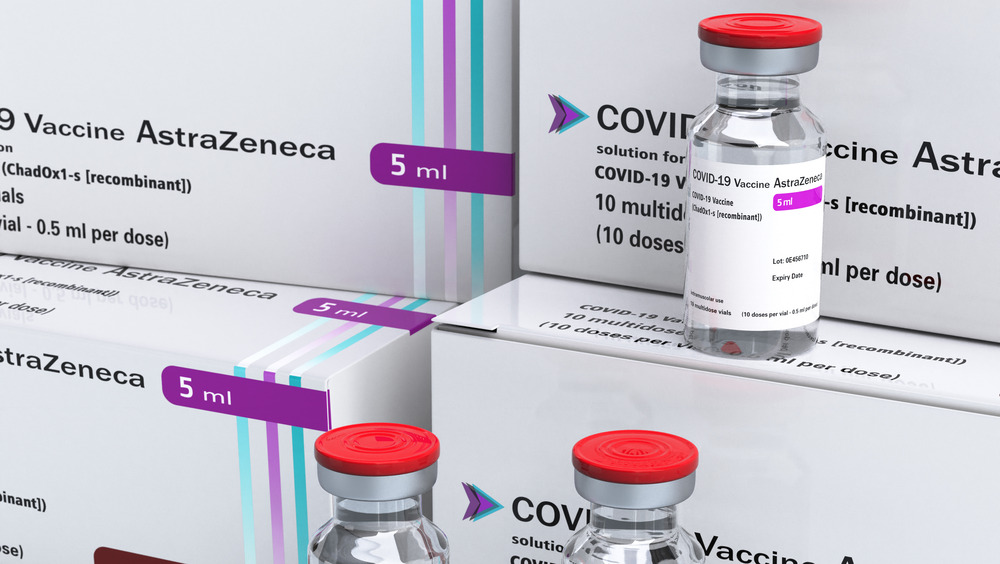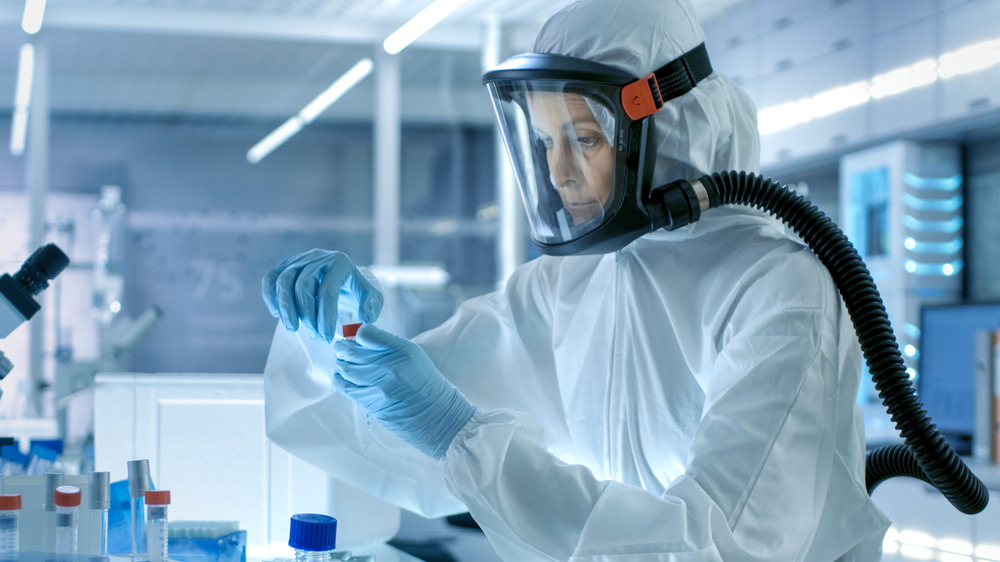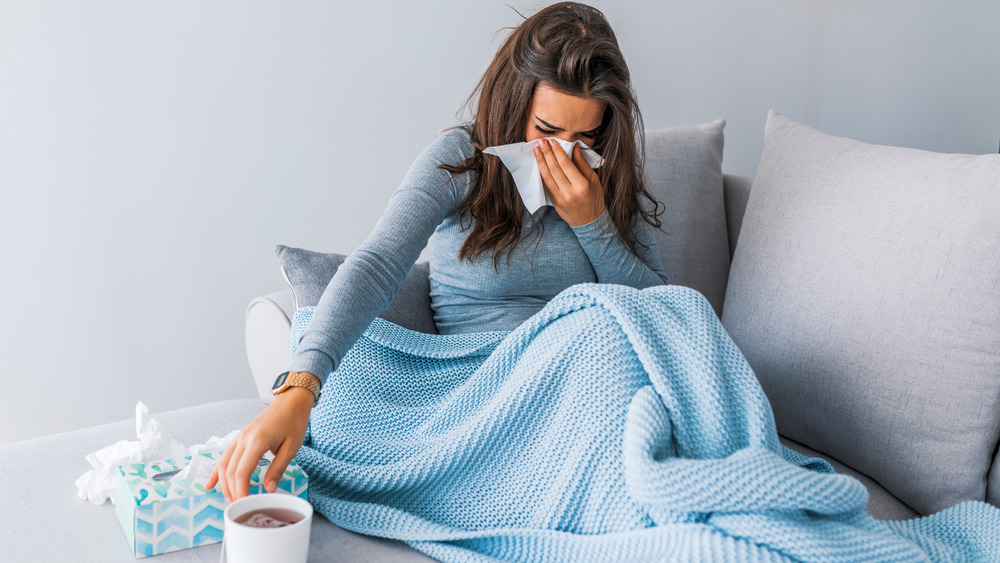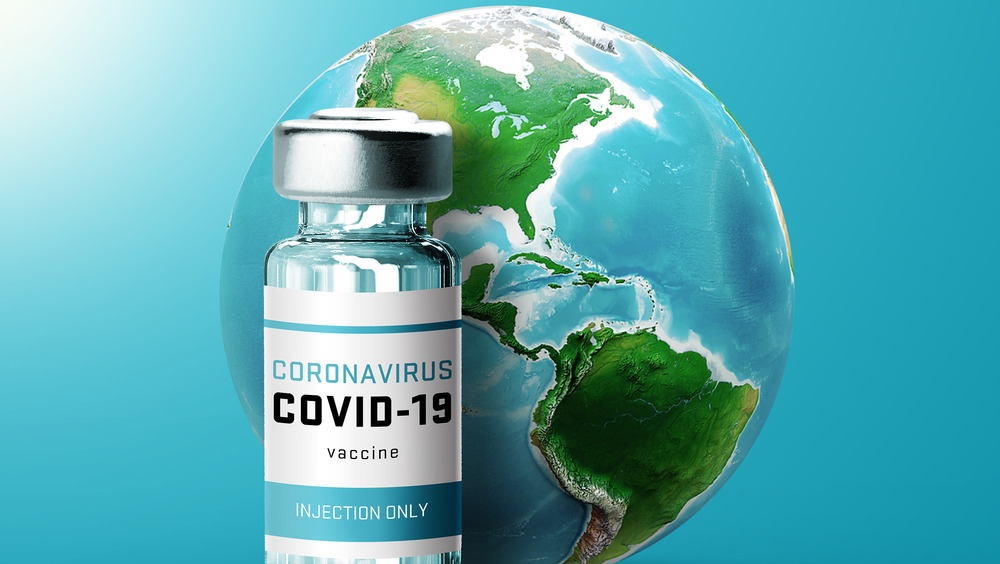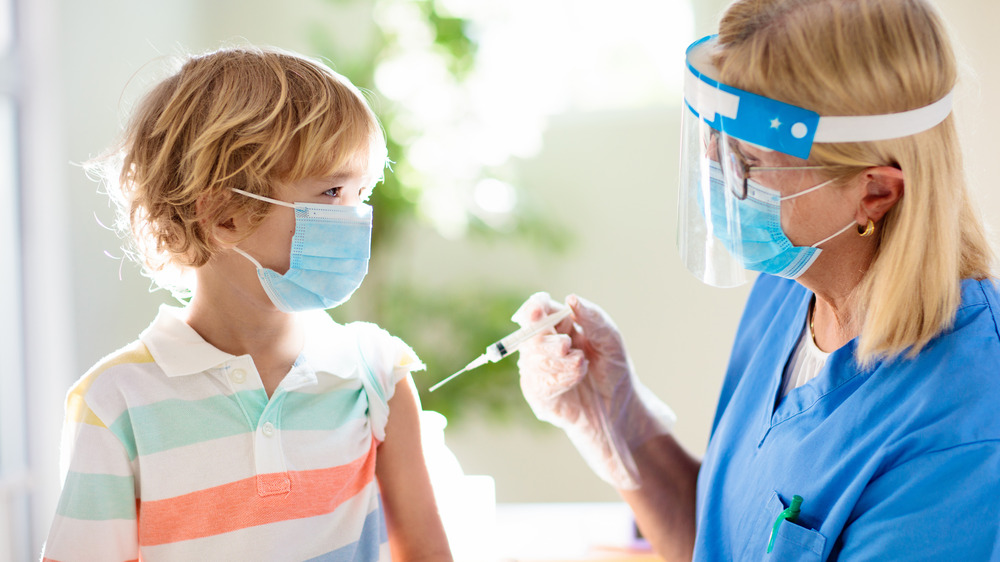The Differences Between Each Of The COVID-19 Vaccines Explained
To reach herd immunity and thus end the COVID-19 pandemic, the majority of people need to get vaccinated (via The Harvard Gazette). But with the authorization of several vaccines in the United States and one in the United Kingdom, how do you know which vaccine you should get? According to the Centers for Disease Control & Prevention (CDC), every FDA-authorized vaccine is safe and effective, and they recommend getting whichever becomes available to you first.
"The companies really have done a good job in trying to mirror their study to represent the real world," Sandra Fryhofer, a general internist and American Medical Association liaison to the CDC's Advisory Committee on Immunization Practices, told the American Medical Association. "Everything just happened a lot quicker than what we're used to, which is good. Now the next thing we've got to do is our job and take advantage of this gift that's been given us." If you're wondering how the different COVID-19 vaccines compare to one another, here's what you need to know.
Moderna and Pfizer's COVID-19 vaccines are mRNA vaccines
Make room in the medical history books. For the first time, vaccines have been made using RNA technology — though the technology has been in the works for a long time. A 2018 Nature Reviews Drug Discovery article reported that mRNA vaccines show promise in battling a slew of infectious diseases. With the urgency of the coronavirus pandemic and the global collaboration of scientists, the timetable to create an mRNA vaccine was moved up. That said, scientists still had time to perform multiple studies testing for safety.
The Centers for Disease Control and Prevention explains that mRNA vaccines, like the Moderna and Pfizer COVID-19 vaccines, teach the body to make a small, harmless viral protein. The protein is quickly detected and neutralized by immune cells, but it's enough time for immune cells to remember it.
The first dose of the mRNA vaccine acts as a study guide prepping the immune cells on what's to come and quizzing them on how to best address a potential threat. The second dose works as exam day. The immune system has studied and knows the material — in this case, the spike protein — like the back of their hand. When it encounters the viral protein, it quickly answers by deploying a robust immune response.
AstraZeneca and Johnson & Johnson's COVID-19 vaccines are viral vector vaccines
Just as there are many ways to make a cake, there are several ways to make a vaccine. Pharmaceutical companies AstraZeneca and Johnson & Johnson took a more conventional route and used a weakened or dead virus to stimulate the immune system into action.
JAMA explains that these vaccines, dubbed "viral vector vaccines," work by injecting a weakened adenovirus — the culprit for the common cold — but it also houses a gene for the SARS-CoV-2 spike protein. The vector is designed so that once in the body, it's unable to cause infection. Once in the cells, it releases viral DNA. Then, "the cell uses viral DNA to produce spike proteins," JAMA explained. Note: These spike proteins are harmless without the entire SARS-CoV-2 virus present. The body is quickly alerted of the foreign presence. It destroys it, leaving behind antibodies and immune cells with an encyclopedic memory that can recall and alert the immune system when the spike protein is detected again.
The Centers for Disease Control and Prevention confirms that viral vector vaccines have been well-studied in clinical trials and are effective in taking down deadly infectious diseases.
The Johnson & Johnson COVID-19 vaccine only requires one shot
Unlike the other COVID-19 vaccines, Johnson & Johnson is a one-and-done shot. It takes just one dose to create a robust immune response. This one dose is 66 percent effective at preventing moderate and severe COVID-19 infection and hospitalization. "It's important that people do not think that one vaccine is better than others," Cody Meissner, a pediatric infectious disease specialist from the Tufts University School of Medicine, explained at an FDA advisory-committee meeting, reported on by Nature. "All of them seem to be equally effective in preventing severe disease with intensive-care needs, and death."
"The good thing about the Janssen [Johnson & Johnson] vaccine is it's one dose and you're done," Dr. Sandra Fryhofer, internist, told the American Medical Association. "You don't have to go back for a second dose. You don't have to make a second appointment. You can get fully vaccinated at one visit."
It also alleviates concerns of people missing out on their second dose and only gaining partial immunity — though a study from the Centers of Disease Control and Prevention reports it's not much of an issue.
Moderna, Pfizer, and AstraZeneca COVID-19 vaccines require two doses
Except for Johnson & Johnson, all other COVID-19 vaccines in circulation as of this writing require two doses to achieve full immunity. A February 2021 report in JAMA explains that two doses are necessary because clinical trial research for Moderna and Pfizer found "a relatively weak immune reaction" weeks after people were administered one dose. However, a more robust immune response was observed when given the second dose.
JAMA also cautions that partial immunity could lead to less protection against COVID-19 variants. "There is no evidence that people who get only 1 dose have adequate long-term protection against COVID-19 infection," JAMA put it plainly.
There has been a lot of discussion over the efficacy of one shot with the AstraZeneca vaccine. However, the World Health Organization continues to recommend two doses. They say further research is needed to test the long-term effects of a single shot.
Doses of the AstraZeneca COVID-19 vaccine are spaced months apart
In areas where the AstraZeneca vaccine is given, you will need to return for a second dose — but not for a while. A preprint study (meaning it has yet to be peer-reviewed and verified by scientists) suggests scheduling doses farther apart may provide even better immunity. The results showed the vaccine was 82.4 percent effective when delayed three months apart compared to the 54.9 percent efficacy observed six weeks apart.
The World Health Organization (WHO) likewise recommends some time between doses, specifically eight to 12 weeks, or two to three months, apart. "It also supports the policy recommendation made by the Joint Committee on Vaccination and Immunisation for a 12-week prime-boost interval, as they look for the optimal approach to roll out, and reassures us that people are protected from 22 days after a single dose of the vaccine," Andrew Pollard, chief investigator of the Oxford vaccine trial and co-author of the preprint study, told CNBC.
Moderna and Pfizer's COVID-19 vaccine doses are spaced weeks apart
While it's essential to receive two doses of either the Moderna or Pfizer COVID-19 vaccine in the U.S., and while you should make every effort to make it to your scheduled appointment, there is some wiggle room.
The Centers for Disease Control and Prevention (CDC) says the Pfizer-BioNTech vaccine should be administered 21 days apart, and the Moderna vaccine should be administered 28 days apart. The timing mirrors the timing of when the second dose was given in clinical trials. "Patients can receive the second dose as long as it follows the immunization window," Rina Shah, group vice president of pharmacy operations and services at Walgreens, told NBC News. "We encourage patients to schedule the second dose appointment as close to the earliest appropriate date, but a bit after is OK."
The CDC recommends sticking to your appointment date whenever possible, of course, but the vaccine efficacy shouldn't change if the second dose is administered four days earlier. And if you must delay your second dose, both mRNA vaccines can be given up to six weeks after the first shot.
The AstraZeneca COVID-19 vaccine is not authorized for use in the U.S.
The AstraZeneca COVID-19 vaccine has not been authorized for use in the United States because the maker has not yet filed for an emergency use authorization with the U.S. Food and Drug Administration (FDA), Vox reported.
When AstraZeneca announced its initial results of its vaccine being 90 percent effective, it soon came to light that different doses were used in the trial, making results inconsistent, per BBC News. In March 2021, AstraZeneca released its phase 3 trial results showing high effectiveness and no safety concerns. But in less than a day, the National Institute of Allergy and Infectious Diseases (NIAID) released a statement saying that "AstraZeneca may have included outdated information from that trial, which may have provided an incomplete view of the efficacy data." The vaccine has also been under fire for the potential to cause blood clots, causing some countries to suspend use temporarily (via CNBC). The European Medicine Agency finds a very rare potential risk for blood clotting. Based on the results, AstraZeneca announced in early April 2021 that it's updating its vaccine label to include the warning.
Could this vaccine make its way to the states? "Even if the FDA deems that this vaccine is a very good vaccine, we don't need yet again another very good vaccine," Dr. Anthony Fauci, the top infectious disease specialist in the U.S., told CNN in early April 2021. "We have enough very good vaccines."
All FDA-authorized COVID-19 vaccines are effective against this variant
At the end of 2020, scientists found several strains with different mutations on the coronavirus spike protein. The B.1.1.7 variant, aka Alpha, is one example where mutations helped make it more transmissible and deadly (via Nature). Since its emergence in the U.K., it has become the dominant strain in the United States (via ABC News). Other strains, including ones found in South Africa and Brazil, have mutations that allow them to be undetected by the immune system.
Moderna and Pfizer vaccines were created before the variants of concern began circulating worldwide. Nevertheless, "all three vaccines authorized in the U.S. — Pfizer, Moderna and Johnson & Johnson — have proven to work effectively against the B-117 variant," ABC News confirmed. Additionally, the Johnson & Johnson vaccine was tested in clinical trials in Brazil and South Africa when the variants were circulating.
While Johnson & Johnson's COVID-19 vaccine has a lower overall efficacy than the Moderna and Pfizer vaccines, the University of California San Francisco explains that it shows strong protection against severe infection and hospitalization.
Depending on particular allergies, one vaccine may be safer for you than another
While rare, allergic reactions to the COVID-19 vaccine can occur in people who have a history of allergies after vaccinations. "Data early on showed about 1 in 100,000 chance of having a severe reaction," Reena Patel, a board-certified medical doctor in family medicine and urgent care physician at Garnet Health, told Verywell Health. "The overall risk is still small, but in the group of people who did have a severe reaction, more than 70% had a previous history of severe allergies."
The Centers for Disease Control and Prevention says allergic reactions can occur from an ingredient of the vaccine. They advise people who are allergic to polyethylene glycol (PEG) to avoid the Moderna and Pfizer vaccines. Instead, such ones should see about getting the Johnson & Johnson vaccine. On the other hand, you should not get the Johnson & Johnson vaccine if you have an allergy to polysorbate. Instead, request an mRNA COVID-19 vaccine (Moderna or Pfizer).
The CDC explains that it's important to discuss with your doctor whether a COVID-19 vaccine is safe for you to take if you have allergy concerns over ingredients or if you're allergic to other vaccines.
The AstraZeneca COVID-19 vaccine is cheaper and could help with global vaccination
To end the pandemic, the world needs to reach herd immunity (via The Harvard Gazette). AstraZeneca might be the key to achieving this. According to Business Insider, AstraZeneca pledged not to profit from its vaccine during the pandemic. Plus, their manufacturing and distribution make it cheaper to distribute than the Pfizer and Moderna vaccines. And unlike the mRNA vaccines, the AstraZeneca vaccine can be stored in a regular fridge for up to six months, Business Insider revealed.
"The vaccine's simple supply chain and our no-profit pledge and commitment to broad, equitable and timely access means it will be affordable and globally available, supplying hundreds of millions of doses on approval," AstraZeneca said in a press release.
The convenience of the AstraZeneca vaccine will help make vaccines more accessible to countries that cannot compete with massive vaccine purchase orders from the United States and the United Kingdom. According to The Conversation, AstraZeneca is committed to COVAX, a global collaboration to "distribute low-cost vaccines to low- and middle-income countries."
Moderna and Pfizer's COVID-19 vaccines require strict storage requirements
A downside to the Pfizer and Moderna mRNA vaccines is their storage requirements: They need to be stored in specialty freezers. According to Science News, mRNA is fragile and needs to be kept frozen to ensure it doesn't break down before injection. For this reason, Pfizer requires a special freezer and shipping containers between –80 and -60 degrees Celsius, or -112 to -76 degrees Fahrenheit. Pfizer vaccines can be stored in a freezer between -25 and -15 degrees Celsius, or -13 to 5 degrees Fahrenheit, but only for two weeks (via Pfizer).
Moderna is less stringent, but not by much. Moderna's COVID-19 vaccines need to be shipped with a temperature between -25 and -15 degrees Celsius. "Vaccine vials may be stored in the refrigerator [between 36 and 46 degrees Fahrenheit] for up to 30 days before vials are punctured," the CDC explained.
Inflexible storage requirements make it less viable for some other countries. "Doing that in high-income countries like the U.S. is one thing," Jessica Atwell, assistant scientist at Johns Hopkins Bloomberg School of Public Health, told Verywell Health. "Trying to do that in low- and middle-income countries around the world where even a normal 2 to 8 degrees C, refrigerator-like temperature, can be really difficult in many parts of the world."
People may have fewer side effects with the Johnson & Johnson vaccine
Vaccine side effects may not be pleasant, but they're not a bad thing. They are a sign that your body is in training and getting ready to knock out COVID-19 if it ever shows up. "Consistently, the second shot is showing more side effects but better immune response," Nitin Desai, CEO and chief marketing officer of COVID PreCheck, explained to Live Science.
While side effects are a good sign, just knowing this fact doesn't make them any more fun. However, Healthline revealed that fewer people reported side effects with the Johnson & Johnson vaccine compared to the mRNA vaccines in clinical trials. And most side effects from mRNA vaccines (think: Pfizer and Moderna) tend to happen after the second dose, which isn't an issue with Johnson & Johnson's single-shot dose. Of course, this doesn't guarantee that the Johnson & Johnson vaccine always comes with more minor side effects.
In early April, the FDA temporarily halted the use of the Johnson & Johnson vaccine to analyze six reports of a severe blood clot following vaccination. "We've lifted the pause based on the FDA and CDC's review of all available data and in consultation with medical experts and based on recommendations from the CDC's Advisory Committee on Immunization Practices," the FDA revealed on April 23. "We have concluded that the known and potential benefits of the Janssen COVID-19 Vaccine outweigh its known and potential risks in individuals 18 years of age and older."
COVID-19 vaccines differ in efficacy
All FDA-authorized vaccines are effective against COVID-19, but numbers show they differ in efficacy. STAT News revealed that the Pfizer vaccine is 95 percent effective at preventing symptomatic infection from COVID-19 after two doses. In contrast, the Moderna vaccine is 94.1 percent effective, with efficacy dropping a bit in people 65 and older — though this may be due to low COVID-19 cases in that particular age group within the trial.
Johnson & Johnson's one-shot vaccine is 66 percent effective against moderate or severe COVID-19 infection globally, 72 percent effective in the United States, 66 percent effective in South America, and 57 percent effective in South Africa. The differences are because of the variants. Moderna and Pfizer released their clinical results before the emergence of variants. For this reason, it's difficult to compare each vaccine because they were created at different time points in the pandemic and with different populations.
"The only way that you can effectively compare to two different medications or two different vaccines is if you have a randomized controlled trial where some people are getting one vaccine and some people are getting the other," Meg Sullivan, physician and medical director for Mecklenburg County Public Health, told WCNC Charlotte. "That didn't happen here."
COVID-19 vaccines are authorized for certain ages
As STAT News explains, Moderna and Johnson & Johnson's COVID-19 vaccines are authorized for use in people 18 years and older in the United States. Similarly, the European Medicines Agency approved the AstraZeneca vaccine for people 18 and up (via Reuters).
The Pfizer vaccine was first authorized for people over the age of 16. In April 2021, Pfizer submitted a request to the U.S. Food and Drug Administration in an effort to expand emergency use authorization to 12- to 15-year-olds based on a pediatric trial in which the company found a 100 percent efficacy in preventing severe infection (via NBC News). In the trial, "the children produced strong antibody responses and experienced no serious side effects," The New York Times reported. The following month, the FDA authorized its use in children aged 12 to 15.
As of this writing, Moderna and Johnson & Johnson are conducting clinical trials to test their COVID-19 vaccines' safety and effectiveness in adolescents, according to ABC News.

